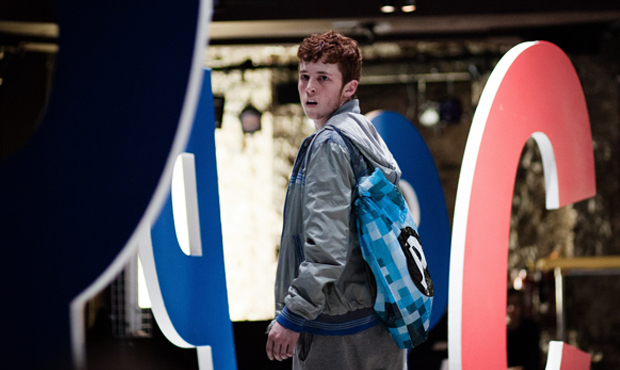Boy (Almeida Theatre)

© Kwame Lestrade
A young boy in a grey tracksuit walks through the city. He's just out of school; not in education, employment or training – a NEET, in the jargon – with nowhere to go and no-one to turn to. His name's Liam; a wiry, white kid who speaks in shards of street slang – the sort you pass without looking twice. That's what happens in Boy: society passes him by.
Leo Butler's play follows Liam for some 36 hours – through parks and public transport, council estates and shopping centres, past bus stops and nightclubs. As he goes, he crosses paths with all and sundry: schoolgirls chatting shit over fried chicken, mothers pushing prams, commuters with their heads in their phones, cleaners, construction workers, doctors, hipsters, tourists, homeless people bedding down for the night. Miriam Buether's eloquent design, a conveyor belt that snakes round in front of us, serves up a diverse cross-section of society – and all of them pass Liam by.
Some stop, some talk, some push him away – but no-one really does anything to help. No-one thinks to – not even those employed to catch these things. At the doctor's, his inarticulate attempt to explain his situation – he's not homeless, but he is sleeping rough on occasion – gets taken for a sexual health enquiry. He's fined by a policeman for fare evasion and sent packing at the job centre. It's not just that Liam falls through the cracks, but that he's shut out by a system he doesn't understand, that makes no effort to understand him. He's got no credit and no cash; no bootstraps to pull himself up by. The only person that stops to see how he's doing is a drug dealer.
Boy never sensationalises poverty, never seeks to wring it for drama. Instead, it shows us the endless grind of its every day; a world that taunts you at every turn; shops full of stuff; people with places to go, places to be. Poverty is boring. Disenfranchisement is dull. Frankie Fox is perfectly unshowy as Liam: hands in his pockets, kicking his heels, occasionally lashing out at the city. He's lost and he hasn't the language to ask for directions.
There are two characters in Boy: Liam and London. In Sacha Wares' staging, the city just seems to happen: one giant machine. We talk of broken Britain, but here, Britain itself is working just fine. It's people that break. Urban furniture – traffic cones and toilets, ticket gates and self-service checkouts – glides into view. This is stage management as art. Casting, too: actors double up as rich and poor, doctors and patients. On the back of a bus stop, the National Lottery logo crosses its fingers. It could, indeed, be you.
Of course, there are hundreds more: all of these lives that we don't get to know, either on stage or in life. Butler reveals how much we overlook day to day, the way other people become a backdrop. You glance across at other audience members. Who's here? Who's not? What does it mean to watch this? To pay to watch this? The conveyor belt delivers these people up like sushi or baggage – hyper aware of the way theatre commodifies lives. Butler's play never presumes to know them, only to overhear them. You leave the theatre and see the city through fresh eyes.
This is a sobering night at the theatre; in many ways, an indictment. Not an enjoyable watch, but an important one – not least in charging us to change. Exemplary in so many ways.
Boy runs at the Almeida Theatre until 28 May.










